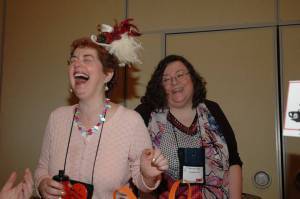Pitch Perfect (Or how to interest readers in two minutes or less)
By Sherry in Northern Virginia who’s hoping it warms back up!

This is how I feel when I hear I have to pitch.
Just the word “pitch” strikes terror into my heart. Most of the articles I found on the topic were about pitching to an agent or editor but I’m writing about pitching to readers after your book is written. Creating the perfect pitch is hard. I had two opportunities to pitch at Bouchercon last week, once during speed dating — where two authors go from table to table and each has three minutes to talk about their books — and also at the new authors breakfast where we each had one minute. Both events are timed and both are designed to get readers interested in your writing.

Alice Loweecey and Barbara Early having fun at Malice Go Round.
Last year at Malice-Go-Round (the Malice Domestic version of speed dating) I listened to about forty authors pitching their books but I only remember two — Barbara Early aka Beverly Allen and Alice Loweecey. They had a routine and were very funny (and again I still remember it!).
So when Barb Goffman and I partnered up for speed dating at Bouchercon I suggested we come up with a joint intro. It went something like this (Barb’s part is in italics):
Hi, I’m Sherry Harris. And I’m Barb Goffman. We’re the long and the short of it. Because I write novels and I write short stories.
It got a laugh every time — It didn’t hurt that I’m tall and Barb, well, isn’t. Even the time keeper told us we were good. (So thank you Alice and Barbara for inspiring me!) I’ve come up with a few tips about pitching your book.
Don’t read — I’ve seen three different types of readers. First up — the nervous Nelly or Ned. I get it, trust me, I was terrified but reading off a card in a wooden voice isn’t inspiring. What’s the worse thing that can happen — you blank in the middle. If you do, laugh it off and blame it on the early morning hour, the lack of caffeine, or your late night. If using notes helps calm the nerves, use them, but only rely on them in an emergency.
Next is the person who reads their back cover copy — I borrowed a line from the back cover copy — it’s well written, it worked in my pitch, but don’t take your book up and just read. That means you’re looking down, not connecting with your audience.
Last there were the blurb readers. Saying: Bestselling author Joe Blow said: This is a tightly written, action packed, thriller that is a must read and kept me up all night to the very last page — doesn’t really help because that blurb could be on the back of any thriller. It doesn’t tell me why I should read your book.
Don’t talk about your website or how if you buy one book, you’ll get another for free — why should I go to your website if you haven’t piqued my interest?
Don’t tell me what you think your book is about in general terms — it’s a charming, twisted tale of love and death, with a bit of humor. Be specific: who is your protagonist, what is his or her dilemma, what makes your story unique. I started mine like this: Sarah Winston’s happy life as an air force wife crash lands when her husband sleeps with a younger woman. Sarah’s self prescribe therapy is going to lots of yard sales (that’s the line I borrowed from the cover copy).
Wow, that was a lot of things I don’t think should be done in a pitch, so here are some things I think should be done.
Try to be conversational. Think of it as telling a good friend about your book. Practice with someone.
Be enthusiasticand put some pep in your pitch. Because if you tell me about your thriller, suspense or mystery but your voice is blasé or too cool for school, I’m not buying it — your pitch or your book
Look people in the eye and look around the room at different people, it helps engage them, and seeing a friendly face out in the audience helps calm your nerves.
 Julie Hennrikus and I practiced on each other and Julie timed our pitches. Hers was only about 30 seconds but she said everything she needed to. I thought she should make it longer but Julie said short was better. And she was right! Being short is so much better than being cut off by the bell or buzzer. But if that does happen in the middle, smile, say thanks, and quit talking instead of continuing on.
Julie Hennrikus and I practiced on each other and Julie timed our pitches. Hers was only about 30 seconds but she said everything she needed to. I thought she should make it longer but Julie said short was better. And she was right! Being short is so much better than being cut off by the bell or buzzer. But if that does happen in the middle, smile, say thanks, and quit talking instead of continuing on.
Julie Hennrikus pointed out that the men at Bouchercon were much better than women about saying: Buy my book. Say it!
The thing I realized, once I stopped running around thinking and saying, I’m terrible at this, is: I’m really not terrible at the pitch and it doesn’t have to be perfect. And conference organizers — would someone please come up with a new authors cocktail party instead of the new authors breakfast?
Readers: Do you have tips for a good pitch?
Filed under: Sherry's posts Tagged: Alice Loweecey, Barb Goffman, Barbara Early, Beverly Allen, bouchercon, julie hennrikus, Malice Domestic, Pitch, Sherry Harris, Speed dating




